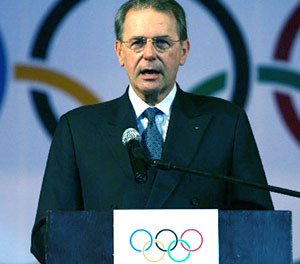Rogge: Olympics must allow police assistance over doping
 Copenhagen/Hamburg - Future Olympic host cities will likely have to allow police raids and other tough measures to fight doping, International Olympic Committee president Jacques Rogge said on Monday.
Copenhagen/Hamburg - Future Olympic host cities will likely have to allow police raids and other tough measures to fight doping, International Olympic Committee president Jacques Rogge said on Monday.
Naming the ongoing fight against substance abuse "an absolute priority," Rogge said that the IOC will look into whether these tough measures which require according national laws can be implemented in the bidding process for the 2018 Games.
"We want the police to help us bust doping networks," Rogge told a news conference.
Rogge said that raids and phone-tapping were key measures to fight the problem more effectively.
At the 2006 Winter Games in Turin, the IOC prompted an Italian police raid on Austrian cross-country skiers, biathletes and officials over doping suspicion.
Athletes were banned and a trial over the affair started last week in Italy, which has according legislation.
The proposed installation of a coaches commission within the IOC by the Olympic congress is another measure to fight substance abuse, targeting the entourage of athletes and at the same time also protecting their general interests in a better way.
But the 66 proposals and statements by the congress did not call for similar commissions for youth or human rights.
Rogge named the recommendations "a prescription ... to strengthen and refresh the Olympic Movement."
The three-day congress brought together all Olympic stakeholders, calling to strengthen athletes rights, maintain the autonomy of sports and the Olympic Movement, to keep the Olympics as the premier sports event but make it easier for future bidders, to encourage youngsters to sports and to embrace the digital revolution.
The proposals must now be confirmed by the relevant institutions and then pass before either the IOC executive board or IOC Session. Rogge expects the changes to be implemented within two years.
Keynote speakers in Copenhagen's Bella Center included United Nations Secretary General Ban Ki-Moon, Nobel Peace Prize laureate Jose Manuel Ramos Horta and communications expert Sir Martin Sorrell.
Apart from swift action on the doping front, Rogge also wants the recommendations regarding youth passed before the inaugural Youth Olympics next year.
"There is a general agreement to engage youth more in sport," he said, hoping that the 2010 Singapore event will serve "as a blueprint" because education will have a big emphasis there as well.
But Rogge left it open whether a special IOC youth commission was necessary to target a key audience for the Olympic future.
Rogge said the same about human rights, the day after Human Rights Watch had called for such a special commission in the wake of violations on the issue in connection with the Beijing Olympics and alleged problems with Sochi 2014 as well.
"We have to see how we can best react," said Rogge, saying it remained open how to implement it in the Olympic Charter and that talks were needed with various organizations including the United Nations. In the aftermath of Rio de Janeiro's election as 2016 host the congress proposed to give the emerging nations a bigger chance in the future as well. The impact of the digital revolution, meanwhile, will see a task force deal with social networks on the internet and popular mobile phone applications - with again the young generation at the centre of the attention.
Martin Sorrell, the CEO of communications services giant WPP, told the congress on Monday that the IOC must act to keep youth interested in the Games.
"Allow young people ready access to the content that you create for them. The young take their media habits with them, so if you are not part of their habit now - you most definitely will not be in their future.
"You need to be present in these environments and have a credible voice - not restricting access through copyright. Let the children play," Sorrell told the Olympians.
Rogge called for the next congress to take place in 2024, while Olympic meetings in Copenhagen conclude with the 121st IOC Session Wednesday-Friday.
Rogge stands for re-election on a final four-year term, golf and rugby sevens seek entrance to the Olympic programme in 2016, new IOC members are to be elected and the Olympians will also hear progress reports from the next Games' hosts. dpa